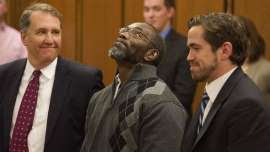Innocent Ohio black man to get $1 million for spending 39 years in jail
On Thursday, an Ohio Court of Claims judge ordered that just more than $1 million be paid to Ricky Jackson.
Ricky Jackson (center) with lawyers Mark Godsey (left) and Brian Howe, looks skyward after being released from his life sentence for a 1975 murder he did not commit.
Jackson said he learnt about the payment from a reporter who had called him on Thursday afternoon to get his reaction over the court order.
"Wow, I didn't know that," Jackson said. "Wow wow wow, that's fantastic, man. I don't even know what to say. This is going to mean so much."
Michele Berry, his attorney from the Innocence Project, said a financial advisor will help Jackson to handle the money in the wisest way.
After hearing the news of the court order, Berry became emotional and expressed her appreciation for all that the innocent black man went through.
"It's been an honor to work for and with Ricky," she said. "He's probably the wisest person I've ever met."
In November, Jackson, 57, and Wiley Bridgeman, 60, were both exonerated in a 1975 murder after a key witness against them, who was 13 years old at the time, admitted in 2013 that he lied during his testimony.
Eddie Vernon, now 53, told a minister who visited him at a hospital in 2013 that he had never actually witnessed the crime. He said Cleveland police detectives coerced him into testifying that the men killed businessman Harry Franks on May 19, 1975.
The Ohio Innocence Project, which took up their case, said Jackson and Bridgeman’s 39 years imprisonment mark them as the longest-serving exonerees in US history.
According to a study released in April, one in every 25 death row inmates in the United States is innocent. Approximately 3,000 US prisoners are waiting to be put to death.
African Americans are also far more likely to be arrested and imprisoned by police than any other racial group, according to a recent analysis by USA TODAY.
Experts say the dramatic gap in arrest and prison rates reflects biased policing as well as the vast economic and educational inequalities that plague much of the US.



Comments